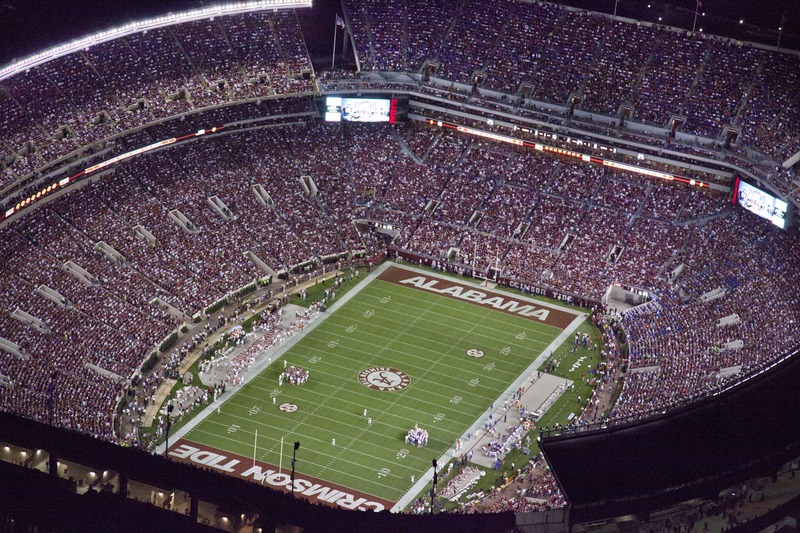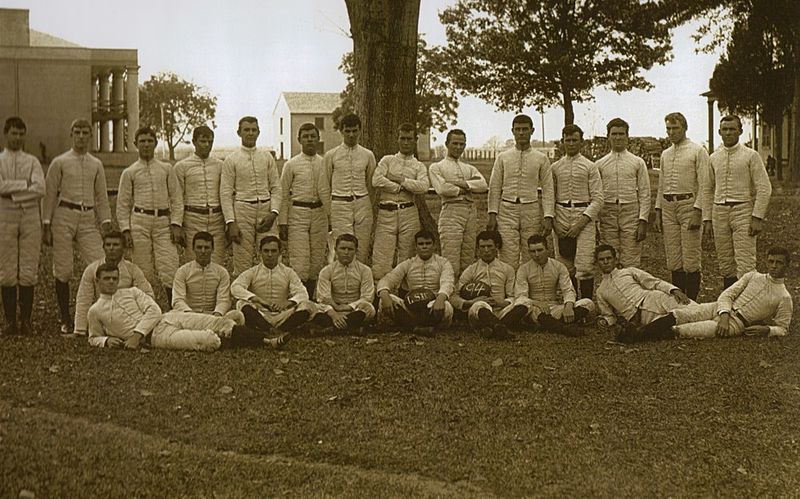Before Maurice Hobson became a Professor of African American Studies at Georgia State University, he was a Division I football player at the University of Alabama at Birmingham. He has since worked with student athletes at institutions across the South. We talked with Maurice about how he became interested in football, his experiences as a player and the race and class politics of southeastern football. As a former player and a fan, Maurice offers a unique perspective on the current problems facing college programs, especially programs in the South, and how we might work to make the sport safer and more ethically responsible.
Bryant-Denny Stadium. Photo: Carol M. Highsmith | Library of Congress
As a child, Maurice played soccer before his older brother joined the high school band and introduced him to football. He would go to football games to see his brother play, and afterward, he would visit the field house at Selma High School where they would take photos with the players. Soon after, his brother went on a trip to an Auburn game and saw Bo Jackson play. His brother came back and announced to the family that they were Auburn fans. After he became interested in the sport, he describes how he learned geography from watching CBS Sports, learning about American regions and what the South meant in relation to other U.S. regions.
NY junior Heisman awards dinner 1985 with Bo Jackson and Curtis High school coach Fred Olivieri. Photo: Vernon Turner via Wikimedia Commons
Once Maurice started playing college football, he began to notice some of the problems in the system. On an off weekend, he travelled to DC to participate in the Million Man March, and he was chided, ostensibly for not hanging out with his teammates instead.
Maurice says that one of his biggest issues with college football is that coaches make decisions about what the players can do and who they can be, and coaches expect them to blindly follow that plan without thinking about what the player actually wants for himself. However, while he feels that football is exploitative, he disagrees with people who call it a modern form of slavery. He asserts that this is a faulty comparison because players can walk away from the game at any time. On the other hand, he also thinks its incorrect to refer to athletic scholarships as a “free ride,” because students work hard for their education—harder than many students who pay their way through college with a traditional job.
From ESPN.com in 2011, the ongoing debate about paying college athletes.
Maurice also points out that many SEC football programs are rife with references to the Civil War, the Old South, and the Confederacy. From the Louisiana State University Tigers, who were named after the Civil War Tiger Brigade, to the University of Mississippi’s Rebels. He also notes that many of these big southern institutions have a history of segregation. That history, Maurice argues, contributes to the troublesome racial politics of the sport, especially in the South.
LSU Tigers Football Team, 1894
We would like to thank Maurice Hobson for his insightful conversation. Maurice is an Assistant Professor of African American Studies at Georgia State University. His work focuses on twentieth-century African American History. His forthcoming book, The Legend of the Black Mecca: Myth, Maxim, and the Making of an Olympic City, examines how Civil Rights Act of 1964 and the Voting Rights Act of 1965 changed the American South.
From Instagram, #collegegameday












